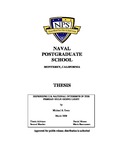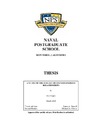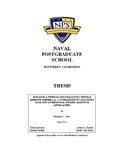Defending U.S. national interests in the Persian Gulf: going light
| dc.contributor.advisor | Moran, Daniel | |
| dc.contributor.author | Gretz, Michael A. | |
| dc.date.accessioned | 2012-03-14T17:41:03Z | |
| dc.date.available | 2012-03-14T17:41:03Z | |
| dc.date.issued | 2008-03 | |
| dc.identifier.uri | https://hdl.handle.net/10945/4204 | |
| dc.description.abstract | Is it possible to defend U.S. interests in the Persian Gulf through the use of primarily SOF/light forces? How might implementing this type of force structure affect the perception of U.S. involvement in the region and its ability to project power on a scale commensurate with its interests? This thesis examines two ways that the U.S. might be able to secure its interests in the Gulf using a minimalist approach. The two methods evaluated are using sea bases in the Gulf and land bases in Djibouti in the Horn of Africa as forward staging bases for SOF operations in the Persian Gulf. The study looks at these two options in terms of costs and benefits both fiscally and physically in terms of the impact that these bases would have on the populations in the Gulf. | en_US |
| dc.description.uri | http://archive.org/details/defendingusnatio109454204 | |
| dc.format.extent | xii, 53 p. : 1 col. map ; | en_US |
| dc.publisher | Monterey, California. Naval Postgraduate School | en_US |
| dc.subject.lcsh | Terrorism | en_US |
| dc.subject.lcsh | Prevention | en_US |
| dc.subject.lcsh | Weapons | en_US |
| dc.subject.lcsh | Anti-Americanism | en_US |
| dc.title | Defending U.S. national interests in the Persian Gulf: going light | en_US |
| dc.type | Thesis | en_US |
| dc.contributor.secondreader | Rasmussen, Maria | |
| dc.contributor.corporate | Naval Postgraduate School (U.S.) | |
| dc.description.service | US Navy (USN) author. | en_US |
| dc.identifier.oclc | 227344403 | |
| etd.thesisdegree.name | M.A. | en_US |
| etd.thesisdegree.level | Masters | en_US |
| etd.thesisdegree.discipline | National Security Affairs | en_US |
| etd.thesisdegree.grantor | Naval Postgraduate School | en_US |
| etd.verified | no | en_US |
| dc.description.distributionstatement | Approved for public release; distribution is unlimited. |
Files in this item
This item appears in the following Collection(s)
-
1. Thesis and Dissertation Collection, all items
Publicly releasable NPS Theses, Dissertations, MBA Professional Reports, Joint Applied Projects, Systems Engineering Project Reports and other NPS degree-earning written works.





